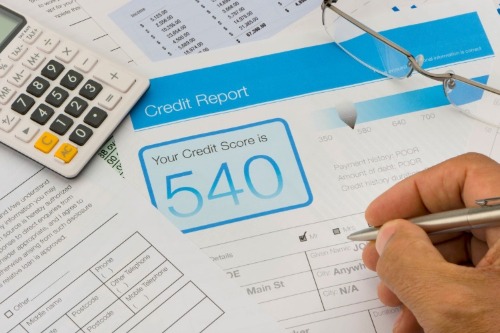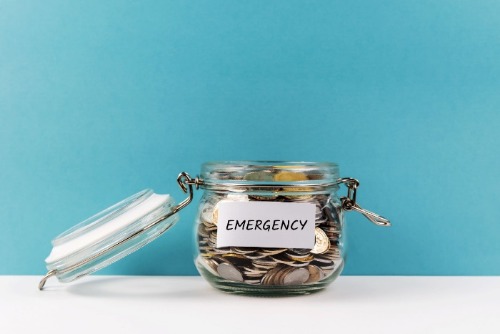If you're thinking about buying a new home, you might be wondering whether to get pre-approved for a mortgage. Getting pre-approval is actually the best way to go, for several reasons. First, it gives you an idea of how much money you'll be able to borrow from the lender. This will help you narrow down your search to homes within your budget. Second, having pre-approval gives you more negotiating power when it comes time to make an offer on a home. The seller will know that you're serious about buying and that you have the financing in place. So if you're thinking about buying a new home, be sure to get pre-approved for a mortgage first!

Mortgage Pre-Approval Gives You an Estimate
When it comes to purchasing a home, mortgage pre-approval is essential and can make the process of buying a house much easier. Pre-approval gives you an estimate of how much you are able to spend based on your financial situation. You don’t want to waste time looking at houses out of your price range. Getting pre-approved allows you to confidently search for a place within your budget. Mortgage pre-approval also aids in streamlining the negotiation process with potential homeowners and speeding up the closing process. It’s a simple step that can simplify the home buying process. Let 1st Community Credit Union help you determine your home buying budget.
It Helps You Know Your Range
Knowing what price range to look in for homes when shopping for your perfect house can save you time and make the whole process more efficient. Pre-approval for a home mortgage is the best way to make sure you know exactly what to expect and what you're able to afford. A pre-approval letter from 1st CCU will not only provide additional leverage during negotiations, it will also make sure that your mortgage rates are as competitive as possible! It's never been easier or faster to get pre-approved, so why wait? Submit an application at 1st CCU to get started. Make your dreams of homeownership a reality and put yourself in the driver's seat with a pre-approval today.
Make a Stronger Offer
Securing a mortgage pre-approval before you start shopping for a home can give you an extra advantage when making an offer. Sellers are more likely to take your offer seriously when they know that you have already been approved for financing and can follow through on the purchase. Pre-approval puts you in a stronger negotiating position and helps ensure that your offer isn’t outbid by someone else who might not be able to secure financing. 1st CCU is dedicated to helping our members get pre-approved so that they can confidently move forward with their home buying journey. Contact 1st CCU to learn more about the process and get pre-approved!
Pre-approval Can Streamline the Process
Gone are the days of endlessly searching for a home without assurance that you'll be able to secure financing. Pre-approval from 1st CCU not only tells you what your budget range should be; it also helps streamline the homebuying process overall. You no longer have to worry about wasting time on homes that you may not have been able to afford; with pre-approval, you can rest assured that you're looking at properties within your price range. Additionally, since the lender has already taken a look at all the pertinent information, if you find a property and decide to make an offer, there’s less time between making an offer and closing on it – making pre-approval the best choice!

Get Started On The Path To Homeownership Today!
There is no better way to begin your journey to homeownership than to get pre-approved for a mortgage. Pre-approval helps you understand exactly what kind of loan you can expect and the amount you are approved for, regardless of any changing market conditions. This will give you peace of mind as you start shopping for your dream home or investment property knowing that you have the right financing in place. With this solid foundation, you can make sure all other aspects of the home buying process go as smoothly as possible. So don’t wait—get started on the path to homeownership today by getting pre-approved for a mortgage!
Getting the keys to your new home isn’t out of reach, it just takes the power of planning. Let us help you reach that home buying milestone with simple, easy home loan pre-qualification from 1st Community Credit Union in Sparta, West Salem and Tomah.
With pre-qualification on a home mortgage loan, before you know it, you’ll be hanging up decor that says home sweet home. Contact us at 1st CCU today!
For many people, managing debt and borrowing responsibly is a part of making a household budget balance out. When used properly, credit and loans can be excellent tools to help you get the major purchases you need or acquire an investment in assets such as education or real estate. There are various types of debt and they won’t always result in the same outcome. The kind of debt that does not invest in anything can be both a short and long term burden.
No matter how much or what type of debt you take on, you need a plan to pay it back. The quicker you pay it off, the less you’ll end up paying on compounding interest. A bit later on, we’ll take a look at proven payment strategies.
Responsible Borrowing
It is important to practice responsible borrowing when taking out loans. Unless you have the financial resources to pay off a loan right away, make sure that you understand all of the terms before signing a contract. Auto loans, car loans, and home loan mortgages are some of the most common types of borrowing. It is important to assess your financial situation before taking out an auto loan or car loan to make sure that you can afford the payments over time.

Home Mortgage Loans
When taking out a home mortgage loan, it is essential to understand the long-term implications of the loan. Home mortgage loans generally come with higher interest rates than other types of loans, and may span over many years. To ensure that you are borrowing responsibly, make sure that you have a full understanding of all associated costs before signing any contracts.
Understanding The Costs
Good credit and debt management is incredibly important in taking out loans. A good credit score and healthy debt-to-income ratios will allow you to access better loan terms, including lower interest rates and potentially more favorable repayment options. Before taking out any type of loan, make sure that you are confident that you can afford the payments over time and understand all of the associated costs. Borrowing responsibly is the key to successful loan management.
Proven Payment Strategies
Though your debts may be different from your neighbors, there are two proven ways to manage your loans. Before choosing a method, consider your financial situation. For maximum effectiveness, it’s best to stick with a method once you start.
-Debt Snowball
This method prioritizes each of your debts by size. First make the minimum monthly payment on all of your debts, then use any remaining money to pay off the smallest balance first. Continue paying as much as your budget allows month after month until that debt is paid off. Once your smallest balance is paid off, apply that payment amount to the next smallest loan in addition to the minimum monthly payment until that too is paid off. As each debt gets down to zero, your payment snowball increases, and you get out of debt faster. Continue this until you’re debt free.
-Debt Avalanche
Similar to the debt snowball method, this plan focuses on the debt with the highest interest rate. Make your minimum monthly payment of each balance and throw every dollar you can at the balance with the highest interest rate. Once you’ve paid that off, jump to the next highest interest rate, continuing the process until you’re debt free. You’ll pay off debt more quickly and reduce overall interest rates.
Remember, borrowing money should always be an informed decision. Knowing your financial situation and understanding all of the terms of a loan are essential to responsible borrowing. With good credit and debt management, you can ensure that any loans taken out will be manageable and beneficial in the long-term.
If you have questions about borrowing responsibly, credit or debt management, it’s best to speak to an experienced and qualified financial advisor, like the people at 1st Community Credit Union in Sparta, West Salem and Tomah. Together we can set you on a path to safely utilize financial tools, like home mortgage loans and auto loans. Just contact us! Let 1st CCU be your partner in responsible borrowing.
The new year is a time for resolutions. Many people resolve to get in shape, spend more time with family, or save more money. If you're looking to save money in 2023, we have some tips that can help! Follow these simple steps and you'll be on your way to saving more money without making any big changes to your lifestyle.
Make a Budget
One way to save money is to make a budget and stick to it. This means knowing how much money you have coming in and what your regular expenses are. Once you have an understanding of your finances, you can start making adjustments to spending in order to free up more money to save.
Cut Back Unnecessary Expenses
There are plenty of ways to cut back on unnecessary expenses. This could mean things like eating out less often, buying fewer clothes, or reducing your entertainment budget. When you take a close look at your spending, you may be surprised at how much money you're wasting on things that aren't really necessary.

Utilize Coupons and Discounts
A third way to save money is to start utilizing coupons and discounts. Whether it's clipping coupons from the newspaper or looking for deals online, taking advantage of sales and discounts can help you save a significant amount of money over time.
Eliminate Debt
A fourth way to save money is to get rid of debt. If you have high interest debt, such as credit card debt, it can be costing you a lot of money in the long run. By paying off your debt, you can free up more money each month to put towards savings.
Budget Some Savings
Finally, another way to save money is to simply start setting aside some money each month into savings. Even if it's just a small amount, over time it will add up and you'll have a nice nest egg built up that you can tap into when needed.
Start Saving Today
Start the new year by resolving to save money in 2023 with 1st Community Credit Union in Sparta, West Salem and Tomah. To save even more, let us help with a service that’s right for you. And if it’s time for a home loan or auto loan that makes sense, we can help you with that too - just contact us! Let 1st CCU be your partner in building a solid financial future.
January often signifies a fresh start for all. If you’re thinking of changing jobs or careers, there’s no better time to move than the New Year. For those who are taking their chances in the job market, don’t wait until the festivities are over. Start preparing your path toward a greener pasture now.
But where do you even start? The first and probably most important thing you need to do is to practice for your job interview.
Review What’s in Your Résumé
Go over all the pertinent information in your résumé before your interviews, such as your work history and skills. When you know your strengths, you can confidently answer the questions that will be thrown your way by the hiring manager even when you’re nervous. Don’t forget to point out how your skills will add value to the company. This can make a good impression on recruiters and might increase your chances of landing a job.

Familiarize Yourself With the Company
It’s essential to know if the company you’re applying to is a good fit for you. Before they call you in for an interview, make sure you’ve done your research. Browse their website or official social media pages to learn about their work culture, goals, and values. This will give you an idea of how you can pitch yourself as a valuable team member once you get hired.
Prepare Questions To Ask During Interviews
Hiring managers prefer those who ask questions during interviews. This gives them the impression that you’re highly interested in the position you’re applying for.
Prepare at least five things you want to know about the company, preferably those that can’t be found on their website or official accounts. This keeps the discussion engaging and allows you to set your expectations about your potential employer.
Do a Mock Interview
It’s not always easy to talk about yourself. But as the saying goes, practice makes perfect. To ensure things will go as smoothly as possible, it’s advisable to do a mock interview before meeting the hiring manager of the company you’re applying for.
Research commonly asked questions in an interview and practice answering them out loud with someone. This trains you to think fast and articulate your thoughts better, even when you’re under pressure. At the same time, it allows you to practice schooling your emotions and body language, so you won’t feel nervous when you’re talking to a potential employer.
Take a Leap With 1st Community Credit Union
More than preparing for a job interview, you also need to build emergency funds before you embark on your new journey. Let 1st CCU be your partner in achieving your career goals. Contact us to learn about our financial solutions.
If your money disappears before your next paycheck, it might be time to look at your budget. To budget effectively, you need to keep your spending in check and jump-start your savings. Simply thinking about it will not suffice. Instead, here are some strategies to help get your budget under control:
Shop With a List
Regular shopping trips are important to ensure you have all your necessities at home. However, when you wander through aisles without a proper plan on what to get, there’s a higher chance you’ll grab things you don’t need. Create a shopping list, whether on paper or your phone, to keep you focused and avoid overspending while shopping. You could also order groceries online for pickup. This will eliminate the lure of end cap deals and help you control your budget.
Sleep on Big Purchases
If you’re planning to buy an expensive item, it’s best to give yourself a waiting period before proceeding with the purchase. Consider whether this is an object you really need and not a situation where you are simply swept up with the excitement of getting something new. A good indication that you should skip buying something is if you’ve forgotten about it after a week.

A good piece of advice for those having a difficult time controlling their spending is to remember their current financial situation and the consequences of overspending. Keep in mind that if you fall into debt, you will end up paying more on interest than you could if you saved up before making a certain purchase. Put off buying something until you can afford it and consistently set aside money so it doesn’t affect your budget.
Another helpful strategy is to keep a lower credit limit that you can easily pay off at one time. This way, there will be minimum to no interest on your bill at the end of the month.
Track Your Spending
One of the best ways to determine where your money is going every month is to track all your expenses. Every separate purchase adds up, and if you’re not careful, you’ll end up spending way beyond your means. Make a list of your transactions and categorize them so you can better see which expenditures are costing you too much money. There are many software applications that can help with this process.
Do a “Spending Fast”
Not spending money on unnecessary items for a period of time might seem difficult. However, doing a “no-spend challenge” for a week, a month, or even a whole year can help you commit to changing your spending habits. Before you know it, you’re already eating out less, foregoing buying new clothes, and generally not wasting money on what you don’t need.
Make Wise Financial Decisions Today
If you need help controlling your budget, 1st Community Credit Union in Sparta, West Salem and Tomah, WI is the one to turn to. We provide a source of credit at a fair and reasonable rate for our members. Contact us for more details.
Regularly checking on your credit history is essential to understanding your current financial health. It provides insights into how well you manage your debt and is a great way to know if you’re in a good position to borrow money. In addition, it also alerts you to fraud and helps you detect inaccurate information on your account.
Lenders may accept or deny your loan applications based on the information provided in your credit report and their own criteria. That’s why before you make big financial decisions like buying a house or a car, it is beneficial to obtain this free document.
How To Get a Free Credit Report
There are three major credit reporting bureaus in the United States: Equifax, Experian, and TransUnion. Fortunately, you are entitled to a free annual report from each of these agencies. The easiest way to request a copy is to visit AnnualCreditReport.com. You may also call (877) 322-8228 or download and complete the request form online before mailing it to:
Annual Credit Report Request Service
P.O. Box 105281
Atlanta, GA 30348-5281
If you wish to obtain all three reports at once, you can order each document separately. By doing this, you can better monitor your credit scores and history throughout the year. Once your free annual report from each agency is used up, they might charge up to $13.50 for subsequent requests.

What To Look For When You Receive Your Credit Report
The information contained in your credit report will help lenders determine whether to extend credit to you or not. Regularly monitoring your credit report status can improve your chances for loan approvals. However, with so many details listed in a single document, it can be overwhelming to review each of them. Here are some of the key points you should pay close attention to when inspecting your credit report:
Personal Information
Check if your credit report has an incorrect or incomplete name, address, or phone number. Multiple birth dates, the wrong social security number, and inaccurate employment information are also considered errors.
Accounts
This section comprises information on all of your credit accounts, such as credit cards, auto loans, and mortgages. Unrecognized accounts, inaccurate status of accounts, and incorrect credit limits are all bad news and should be verified.
Public Records
Lenders and other third parties will also inspect your public records for financial transactions like bankruptcies, foreclosures, and tax liens.
Inquiries
Reviewing your credit report will also help you detect if a company pulled your report without your permission or knowledge. This may mean that a fraudster applied for an account in your name.
Entrust Your Finances to Us
If you need help requesting a credit report, turn to us at 1st Community Credit Union. We take pride in delivering friendly and personalized service to our members. Contact us to get started on your journey to achieving financial independence.
Setting aside cash can give you peace of mind when unplanned situations happen. After all, unforeseen payments for medical bills, home repairs, and other emergencies can set you back and lead to financial losses.
Reserved money for unexpected expenses can help you feel more secure and confident about the future. So, it’s best to have enough cash stored. To help you understand the concept better, here’s everything you need to know about emergency funds:
Why Is an Emergency Fund Important?
Financial stability is beneficial to enjoying and maintaining your lifestyle. Therefore, an emergency fund can keep you on track and protected when unforeseen situations occur. Consider your emergency fund a safety net, reducing the need for high-interest credit cards and personal loans.
How Much Is Enough for an Emergency Fund?
There is no set amount required when it comes to saving for unplanned expenses. It usually depends on your lifestyle, income, costs, and dependents. However, keeping three to six months’ worth of monthly fees can be a good amount to start with.

What Are the Ways to Save for Unplanned Expenses?
Reaching the ideal amount for emergency funds might be challenging to accomplish, especially if you’re living paycheck-by-paycheck. To help ease the process, the following are some practices you can do:
Keep a Budget
Monitoring your income and expenses is a good rule of thumb when you’re saving for emergencies. If you track your spending habits, you’ll be able to calculate how much you can set aside without making drastic changes to your lifestyle.
For example, you’ve noticed that much of your money goes to unnecessary apparel. You can cut back a portion from your usual clothing expenses and allot them to your emergency fund.
Set a Goal
Rather than instantaneously putting a significant amount in your savings account, you can aim for a more feasible goal like a month’s worth of expenses. This mindset will lessen the pressure of saving and help you develop a habit. Once you reach the initial amount, you can gradually increase your goal.
To determine your monthly expenses, you must combine every factor you spend based on your budget. Your calculations may include costs for housing, food, transportation, and other necessities.
Save Excess Income
If you receive more money than you usually do, it’s best to allocate it to your emergency fund. It may be tempting to spend your tax refunds, holiday pays, and other sources of income, but taking advantage of these bonuses can jumpstart your savings.
Secure Your Money
A good way to keep your emergency funds intact is to deposit them in a separate account. If you need a place to store your savings, you can contact us at 1st Community Credit Union. We can keep your money safe for unexpected situations. Get in touch with us today so we can discuss your financial plans.
Identity theft occurs when someone uses your personal data to commit fraudulent acts. This can include your name, birthday, and other important pieces of information like your social security number. It is done most of the time to steal money or purchase expensive items.
Nowadays, even the information of teenagers and college students can be used to commit fraud of any kind. Such a matter can be tricky to navigate as a young adult, but there are ways to educate younger generations to prevent these crimes and protect their identify. We have listed a couple of tips to help youngsters avoid having their personal information stolen.
Be Alert to Phishing and Spoofing
Phishing and Spoofing are two of the most common ways information can be taken unknowingly from an individual. Some scammers are known for making calls seem like they are from big companies when in fact, they’re only trying to get your important details.
With that being the case, it’s best not to answer calls from unknown numbers. In addition, be wary of emails from unknown addresses as they may contain malware that can harm your computer. Never download attachments from someone who sends them unexpectedly.
Try Enabling Two-Factor Authentication on Your Devices
Stolen passwords account for 81% of fraudulent hacks. To better secure your personal data, enable two-factor authentication on your social accounts and emails. This can add an additional layer of protection to your information.
Two-factor authentication works by having multiple identifiers to access an account. It can be a combination of a password, biometric signature like a fingerprint, and possession such as a phone or tablet. Even if your device is stolen, the thief will have trouble trying to access your information.

Install Antivirus Software on Your Devices
Nowadays, most of our information is kept on electronic devices like phones, computers, and laptops. As a result, it can be difficult to deal with if one of your devices get compromised. A good way to protect your devices and your identity is by downloading antivirus software on them.
Hackers may use malware that contains viruses, spyware, and other unwanted software. Having antivirus software on your device can keep them from harming your hardware and, by extension, your information.
Clear Out the Data on Your Electronics
If you’re upgrading electronics and giving away your old ones, make sure to clear out all of the data on the used hardware, as they can be restored with a data recovery program.
Luckily, there are programs that can help you wipe your used devices with just a few clicks. If you want to save the information left, there are also applications that can transfer your data to a new device.
One recommendation to avoid having data stolen off your phone at any time is to encrypt your phone. In this scenario, any data left on your phone will be scrambled and therefore safe, even if you lose your phone unexpectedly.
Let Us Provide You Efficient Security Against Identity Theft
If you want to protect your account against potentially fraudulent activity, 1st Community Credit Union can equip you with fraud-fighting tools. We take pride in serving our members in the best way we know. Get in touch with us today!
